
U.S. Government's Memorandum of Law in Opposition to Defendant Reza Zarrab's Motion for Bail
By Preet Bharara, United States Attorney for the Southern District of New York

U.S. Charges 4 Turks With Conspiring to Violate Iran Sanctions
By Benjamin Weiser on The New York Times
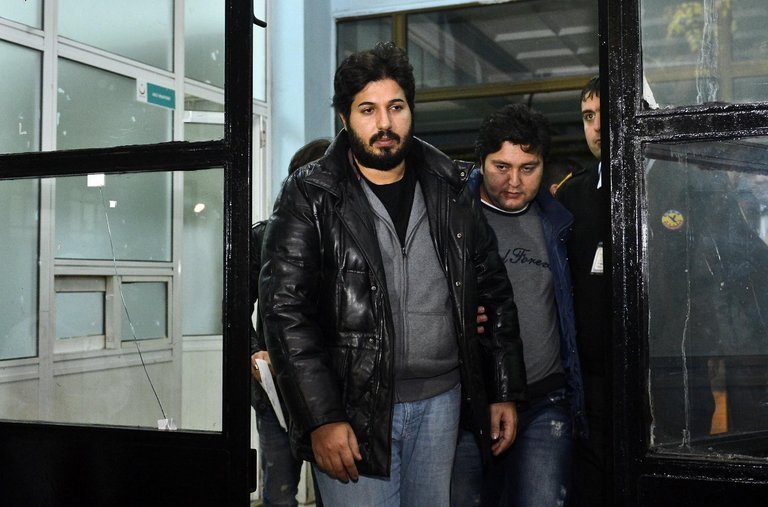 Reza Zarrab, center, in Istanbul in 2013. Mr. Zarrab has been accused of conspiring to violate the United States’ sanctions against Iran.
Reza Zarrab, center, in Istanbul in 2013. Mr. Zarrab has been accused of conspiring to violate the United States’ sanctions against Iran.Federal prosecutors in New York announced on Wednesday the filing of a new indictment that charges a former Turkish economy minister and three other Turks with participating in a broad conspiracy to violate the United States’ sanctions against Iran.
The new charges represent a significant expansion of a case that had already drawn the attention of the Turkish president, Recep Tayyip Erdogan, senior members of the Trump administration and President Trump’s informal adviser, Rudolph W. Giuliani.
Mr. Giuliani has been retained by one defendant, Reza Zarrab, to try to negotiate a diplomatic resolution to his case. Mr. Giuliani has met with Mr. Erdogan to discuss the case; in the past, Mr. Erdogan claimed there were “malicious” intentions behind Mr. Zarrab’s prosecution.
Prosecutors have charged that Mr. Zarrab, a gold trader and dual citizen of Iran and Turkey, and his co-defendants conspired to facilitate millions of dollars in transactions on behalf of Iran and other sanctioned entities through the use of front companies and false documentation.
The most prominent new defendant charged was Mehmet Zafer Caglayan, 59, who served as the Turkish economy minister from 2011 until 2013 and currently serves in the Turkish Parliament, the indictment said.
While Mr. Caglayan was a minister, the indictment charged, he “received tens of millions of dollars’ worth of bribes in cash and jewelry from the proceeds of the scheme to provide services” to the Iranian government and concealed those services from United States regulators.
The new indictment also said that high-ranking government officials in Iran and Turkey “participated in and protected this scheme,” with some officials taking bribes.
In addition, the indictment said, the leaders of a bank that is majority-owned by the Turkish government “participated in the design of fraudulent transactions intended to deceive U.S. regulators and foreign banks.” Other court filings show it is Halkbank.
The new indictment comes at a time of testy relations between Turkey and the United States, which are both members of NATO. Last week, Mr. Erdogan denounced another federal indictment — against three of his bodyguards over a brawl in Washington during his visit in May. Twelve other Turkish security officers were charged in that case in June.
Mr. Erdogan has also repeatedly called on the American authorities to extradite Fethullah Gulen, a cleric who lives in exile in Pennsylvania. He is the leader of a Turkish Muslim sect accused by Mr. Erdogan of having helped orchestrate an attempted coup that roiled Turkey in July 2016.
Mr. Gulen, a longtime critic of Mr. Erdogan’s, has denied any connection to the coup attempt and vowed to fight extradition.
In addition to Mr. Caglayan, the new indictment charged Suleyman Aslan, a former general manager of the bank; Levent Balkan, another former bank executive; and Abdullah Happani, an associate of Mr. Zarrab’s.
The four defendants charged on Wednesday are not in United States custody, prosecutors said.
Mr. Zarrab has pleaded not guilty. His lawyer, Benjamin Brafman, had no comment.
Article posted at https://www.nytimes.com/2017/09/06/world/middleeast/turkey-charges-iran-sanctions.html

U.S. Can Pursue Turk Accused of Conspiring to Violate Iran Sanctions
By Benjamin Weiser on The New York Times
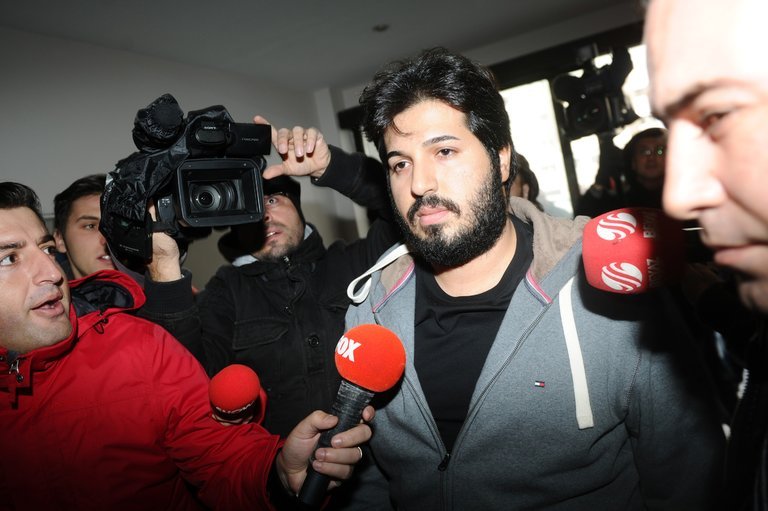 Reza Zarrab has been accused of facilitating millions of dollars in transactions on behalf of Iran.
Reza Zarrab has been accused of facilitating millions of dollars in transactions on behalf of Iran.A federal judge in Manhattan refused on Monday to dismiss an indictment against a Turkish gold trader, Reza Zarrab, who has been jailed in New York and is awaiting trial on charges that he conspired to violate United States sanctions on Iran.
Prosecutors have accused Mr. Zarrab, 33, of facilitating millions of dollars in transactions on behalf of Iran and other sanctioned entities through the use of false documentation and front companies. He has also been charged with conspiracies to commit money laundering and bank fraud.
Mr. Zarrab’s lawyers had asked the judge, Richard M. Berman of Federal District Court, to dismiss the indictment, calling the government’s case “unprecedented” and “a prosecutorial overreach of the first order.”
Judge Berman, in rejecting the defense arguments, ruled that the indictment clearly set forth the required elements for the charges.“The dismissal of an indictment is an ‘extraordinary remedy’ reserved only for extremely limited circumstances implicating fundamental rights,” he wrote.
The case of Mr. Zarrab, who has pleaded not guilty, has been closely watched in Turkey, where in 2013 he was detained by the authorities during a corruption investigation of businessmen with close links to Recep Tayyip Erdogan, then the country’s prime minister and now its president.
Recently, Mr. Erdogan has said that he had raised Mr. Zarrab’s case with Vice President Joseph R. Biden Jr. during talks at the United Nations, according to Turkish news reports. Mr. Erdogan has also said there were “malicious intentions” in the prosecution of Mr. Zarrab, according to the reports.
In seeking dismissal of the charges, Mr. Zarrab’s lawyers argued that the United States sanctions laws were “limited to U.S. persons and exports from the U.S.” The prosecutor’s efforts to extend those laws in Mr. Zarrab’s case, the defense said, “is not only unjustified and a due process violation, it is a dangerous extension of U.S. law that should not be allowed.”
The office of Preet Bharara, the United States attorney for the Southern District of New York, had asked the judge to deny the defense motion. “What arguably is unprecedented about this case,” the prosecutor’s office wrote, “is the scope, complexity and reach of the defendant’s own unlawful scheme, and his level of access to both Iranian and Turkish government officials and to banks to arrange and facilitate that scheme.”
Benjamin Brafman, a lawyer for Mr. Zarrab, and Mr. Bharara’s office each had no comment on the judge’s ruling.
Mr. Zarrab, who is being detained without bail, is scheduled for trial on Jan.
Article posted at https://www.nytimes.com/2016/10/18/world/americas/turkey-reza-zarrab-gold-trader.html

Turk in Iran Sanctions Case Adds Rudy Giuliani to Legal Team
By Benjamin Weiser and Maggie Haberman on The New York Times
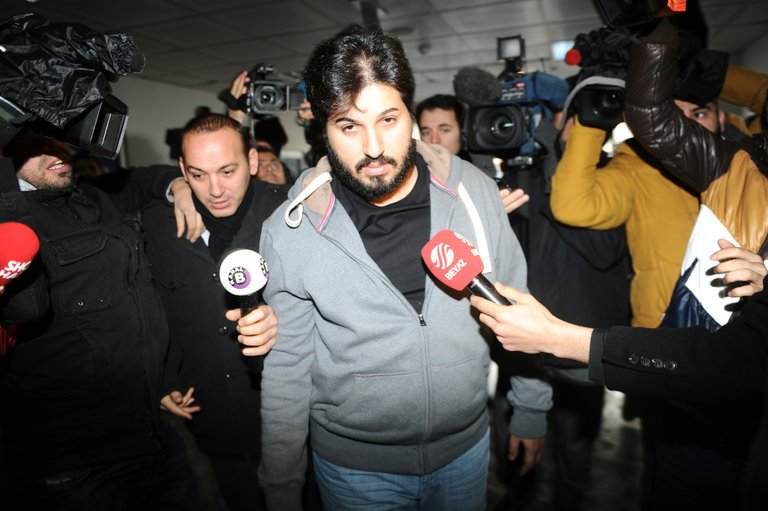 Reza Zarrab, a prominent Turkish gold trader jailed in New York last year on charges of violating the United States sanctions on Iran, at a police center in Istanbul in 2013.
Reza Zarrab, a prominent Turkish gold trader jailed in New York last year on charges of violating the United States sanctions on Iran, at a police center in Istanbul in 2013.Reza Zarrab, a prominent Turkish gold trader who has been jailed in New York on charges of violating the United States sanctions on Iran, has added Rudolph W. Giuliani, the former New York mayor, to his legal team, adding intrigue to a case that has been steeped in international politicking between Turkey and the United States.
Just last month, Mr. Giuliani and another prominent lawyer, Michael B. Mukasey, traveled to meet with the Turkish president, Recep Tayyip Erdogan, as part of their efforts on behalf of Mr. Zarrab, according to a person briefed on the meeting who spoke on the condition of anonymity because of the sensitivity of the trip.
Mr. Giuliani is close to President Donald J. Trump, raising the question of whether Mr. Zarrab has retained him in an effort to negotiate a beneficial resolution of his case at the highest levels of the Trump administration. Mr. Mukasey is a former federal judge and attorney general in the George W. Bush administration.
Since Mr. Trump’s election, there has been a warming of ties between Turkey and the United States, with officials close to Mr. Erdogan quoted as saying they see the prospect of a fresh start in relations.
The United States attorney’s office in Manhattan said in a court filing on Monday evening that it was told that Mr. Giuliani and Mr. Mukasey “have been retained by the defendant and are involved in, and will continue to be involved in, efforts to explore a potential disposition of the criminal charges in this matter.”
Mr. Zarrab, 33, who was born in Iran and moved to Turkey as an infant, has dual citizenship. He was arrested in March 2016 as he arrived on a trip to Miami, and was sent to New York to face charges. Prosecutors, arguing against bail, said Mr. Zarrab had used his considerable wealth and influence to be released from a prison in Turkey after he was detained there in 2013 as part of a corruption investigation of businessmen with close ties to Mr. Erdogan, then Turkey’s prime minister.
Mr. Erdogan has publicly criticized Mr. Zarrab’s prosecution in the United States. According to Turkish news reports, Mr. Erdogan said last fall that he had raised Mr. Zarrab’s case with then-Vice President Joseph R. Biden, Jr. during talks at the United Nations, and Mr. Erdogan also said there were “malicious" intentions in the prosecution, according to the reports.
Mr. Zarrab has been charged with facilitating millions of dollars in illicit transactions on behalf of Iran and other sanctioned entities through the use of front companies and false documentation. Prosecutors have said he “allegedly tricked numerous U.S. financial institutions into processing barred transactions.” Mr. Zarrab has also been charged with conspiracies to commit money laundering and bank fraud. He has pleaded not guilty to the charges, and was ordered detained without bond.
Mr. Zarrab’s decision to retain Mr. Giuliani and Mr. Mukasey was revealed on Monday in a court filing by the office of Joon H. Kim, the acting United States attorney in Manhattan, who took office this month after Preet Bharara was dismissed by the Trump administration.
Mr. Kim’s office said it was advising the judge, Richard M. Berman, of potential conflicts of interest posed by representation of Mr. Zarrab by the two lawyers, noting that Mr. Giuliani’s firm, Greenberg Traurig, and Mr. Mukasey’s firm, Debevoise & Plimpton, had each represented banks that prosecutors say were victims in the case. Mr. Kim’s office asked that the judge hold a hearing on the issue.
Mr. Zarrab’s lead lawyer, Benjamin Brafman, responded in a letter to the judge, saying no hearing was necessary because no lawyers from either firm “will have any involvement in the trial preparation or trial in this case, and neither Mr. Giuliani nor Mr. Mukasey intends to file a notice of appearance before your honor.”
“Their roles will not require any appearing in court,” Mr. Brafman wrote.
Mr. Brafman, Mr. Mukasey and a spokeswoman for Mr. Giuliani each had no comment on Monday. The United States attorney’s office also declined to comment.
Mr. Kim’s office, responding with the filing in the evening, argued that a hearing was “especially appropriate and necessary at this time if, as the letter from defense counsel indicates, Mr. Giuliani and Mr. Mukasey’s involvement in this case is intended to occur entirely outside of the court’s purview and knowledge.”
Adding to the intrigue surrounding the Zarrab case is the fact that Mr. Giuliani has recommended Mr. Mukasey’s son, Marc L. Mukasey, a fellow lawyer at Greenberg Traurig, to Mr. Trump to become the next United States attorney in Manhattan, according to two people briefed on the discussions. The firm’s spokeswoman said the younger Mr. Mukasey has no involvement in the Zarrab case.
Article posted at https://www.nytimes.com/2017/03/27/nyregion/reza-zarrab-iran-sanctions-case-rudolph-w-giuliani-to-legal-team.html

A Mysterious Case Involving Turkey, Iran, and Rudy Giuliani
By Dexter Filkins on The New Yorker
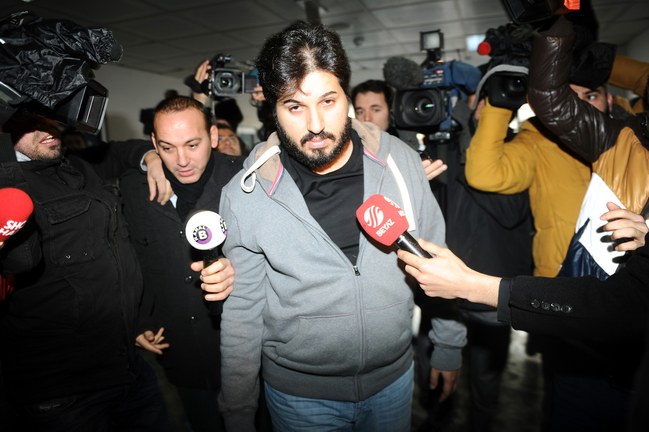 In the year since his arrest by the F.B.I., the questions—and conspiracy theories—about the Turkish-Iranian businessman Reza Zarrab have only multiplied.
In the year since his arrest by the F.B.I., the questions—and conspiracy theories—about the Turkish-Iranian businessman Reza Zarrab have only multiplied.The mysterious case of Reza Zarrab, a Turkish-Iranian businessman facing federal charges in New York, has grown even stranger over the past couple of weeks.
Zarrab, who is thirty-three, was arrested by F.B.I. agents, in Miami, last March. At the time, he was one of the flashiest and wealthiest businessmen in Turkey. He sported a pouf of black hair; owned twenty houses, seven yachts, and a private jet; was married to one of Turkey’s biggest pop stars; and counted among his friends Recep Tayyip Erdoğan, Turkey’s strongman President.
The U.S. government, however, believes that Zarrab masterminded a sprawling operation to help the Iranian government evade economic sanctions that were put in place to hinder the country’s nuclear-weapons program. Zarrab’s operation—which relied on what the Turkish government claimed was a legal loophole in the sanctions—involved shipping gold to Iran in exchange for oil and natural gas, which Zarrab then sold. The scheme, according to prosecutors in New York’s Southern District, involved moving enormous amounts of cash, gas, and gold; at the operation’s peak—around 2012—Zarrab was buying a metric ton of gold and shipping it to Iran every day. The Obama Administration protested Zarrab’s operation, which the media dubbed “gas for gold,’’ but he carried on anyway. For the Iranians, the gold was as good as American cash, and it helped shore up the rial, Iran’s currency, whose value was collapsing.
Since last March, Zarrab has been sitting in the Metropolitan Correctional Center, in Manhattan, awaiting trial. The questions—and conspiracy theories—about him and his case, meanwhile, have only multiplied. At the time of his arrest, Zarrab was more or less living under the protection of the Turkish government, and he had every reason to believe that the U.S. government was after him. Why, then, did he fly to Miami? Zarrab told agents that he was on a family trip to Disney World. But many Turks who follow the case believe that Zarrab flew to the United States in an attempt to strike a deal with American prosecutors.
Why would he do that? It’s not clear if any deal was ever discussed, but Zarrab is probably in possession of enough evidence to implicate several senior members of Turkey’s government, whom American prosecutors say Zarrab was bribing so that he could carry on with his scheme. Zarrab, prosecutors have told a federal judge in New York, used “his tremendous wealth not only to purchase several homes, yachts and other assets, but also to buy access to corrupt politicians in Turkey.”
Zarrab’s far-flung activities first came to public light four years ago—entirely by accident. On January 1, 2013, a cargo plane from Accra, Ghana, was diverted to Istanbul’s main international airport, because of fog. When customs officials searched the plane, they found three thousand pounds of gold bars. Turkish prosecutors—who at that time still had enough independence to challenge the central government—determined that Zarrab had been paying millions of dollars in bribes to senior officials in Erdoğan’s government, and they had the businessman arrested and charged. The police themselves were stunned. “We didn’t expect this little investigation to give way to a bigger one,’’ Nazmi Ardıç, the chief of the Istanbul police department’s organized-crime unit, told me in 2015.
According to documents filed in U.S. District Court in Manhattan, the Minister for the Economy, Zafer Çağlayan, accepted more than forty-five million dollars in cash, gems, and luxury goods from Zarrab. When police entered the home of Süleyman Aslan—the C.E.O. of Halk Bank, which Zarrab allegedly used to launder his money—they found shoeboxes stuffed with four and a half million dollars. (Both Çağlayan and Aslan have denied any wrongdoing.) Wiretapped phone conversations also appeared to implicate members of Erdoğan’s family.
The cargo-plane incident and subsequent investigation of Zarrab roiled Turkish politics. Erdoğan, instead of backing down, accused Fethullah Gülen, an imam and former ally living in exile in the Poconos, in Pennsylvania, of trying to mount a coup against him. It was then that Erdoğan initiated the first in a series of purges across the Turkish government, firing, transferring, or jailing thousands of police officers and prosecutors. Afterward, the charges against Zarrab were dropped, and he was released from prison. The power struggle between Erdoğan and Gülen climaxed last summer, when followers of Gülen inside the Turkish military took part in a real attempted coup against Erdoğan’s government. Erdoğan beat back the uprising, but not before more than two hundred and sixty people were killed. Since then, Erdoğan has been busy arresting and detaining anyone linked to the country’s democratic opposition, and many people who are not.
Zarrab’s arrest in the U.S. occurred a few months before the attempted coup. Since then, Erdoğan has tried to have Zarrab sprung; last year, his government asked Loretta Lynch, then the U.S. Attorney General, to release him, and Erdoğan himself raised the issue last September in a meeting with Joe Biden, then the Vice-President. Erdoğan even accused the U.S. Attorney who indicted Zarrab, Preet Bharara, as well as the judge overseeing the case, Richard Berman, of having links to Gülen, whom Erdoğan describes as a “terrorist.” Bharara and Berman, Erdoğan charged, had been “wined and dined” by Gülen’s organization.
Why does Erdoğan care so much about Zarrab? It could be that Erdoğan is just a loyal friend. But the evidence found by Turkish prosecutors in the original case against Zarrab suggests that Erdoğan himself, or his family, could be tied to Zarrab’s scheme. Perhaps Erdoğan is afraid that Zarrab, facing decades in prison, will eventually talk.
After his arrest, in Miami, Zarrab hired some of the most expensive lawyers in New York. They tried to secure a comfortable bail arrangement—and failed. They then sought to have the case thrown out entirely, and failed at that, too. For a time, it looked as though the Zarrab case was headed for trial. Then, last month, came several dramatic developments. Zarrab fired most of his lawyers and hired Rudy Giuliani, a confidant of President Trump, and Michael Mukasey, the former U.S. Attorney General. Then Trump fired Bharara, the prosecutor who indicted Zarrab in the first place. With a legal team friendly to the President in place, and a hostile prosecutor out of the way, Zarrab may be hoping for a sweet deal from the prosecution. It has since been revealed that Giuliani and Mukasey travelled to Turkey in February to meet with Erdoğan about the case—another of Zarrab’s lawyers said that they were seeking a “diplomatic solution” to the situation. Berman, the judge, has asked that Giuliani and Mukasey provide more information about their role in the case.
Finally, another new layer of mystery: last month, F.B.I. agents arrested Mehmet Hakan Atilla, the deputy C.E.O. of Halk Bank—the same bank that prosecutors allege that Zarrab used to launder his gas-for-gold transactions—upon his arrival at J.F.K. International Airport, in New York. The case against Atilla was built on much of the same evidence—wiretapped phone conversations—that was used to charge Zarrab. (On Thursday, Atilla pleaded not guilty to the charges against him.) What was going on? Would Atilla simply fly to J.F.K. without a care, even though his former client had been arrested a year earlier in a very public case? Or was something murkier at work?
The Turkish government was not happy with Atilla’s arrest; Halk Bank is one of the largest financial institutions in the country. As with almost everything that goes wrong in Turkey these days, the country’s leaders are blaming Gülen, the exiled imam in the Poconos. “The move against Halk Bank’s Atilla,’’ Binali Yıldırım, the Turkish Prime Minister, said, “is another plan and trick of the Gülen movement.”
Article posted at https://www.newyorker.com/news/news-desk/a-mysterious-case-involving-turkey-iran-and-rudy-giuliani

A new report about a Turkish gold-dealer is raising questions about why Preet Bharara was fired
By Natasha Bertrand on Business Insider
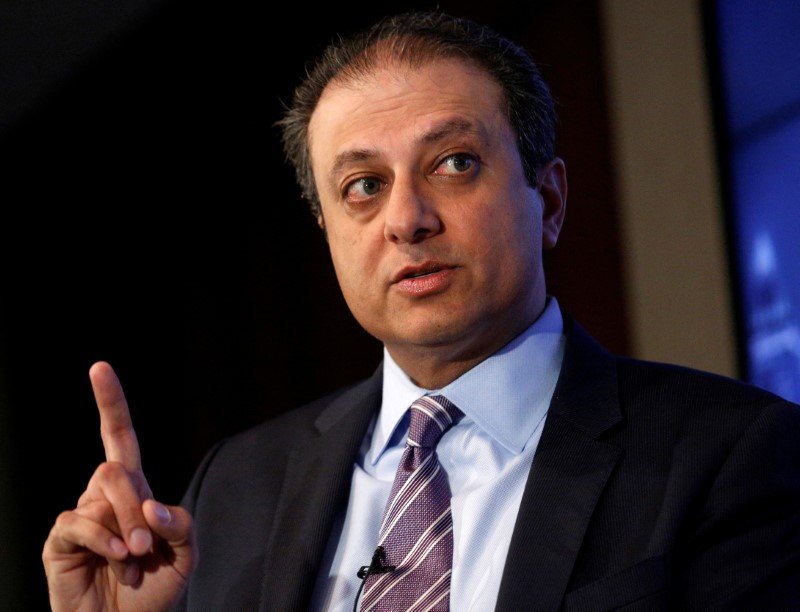
Turkish president Recep Tayyip Erdogan asked former Vice President Joe Biden to fire US attorney Preet Bharara last September over Bharara's involvement in denying bail to a Turkish-Iranian gold dealer set to go to trial in New York next month on charges of fraud and money laundering, according to The Washington Post.
Bharara wrote a memo last May alleging that the dealer, Reza Zarrab, "facilitated millions of dollars-worth of transactions on behalf of Iran... through a global network of companies located in Turkey and the United Arab Emirates " designed to evade US sanctions.
The allegations did not stop at an elaborate laundering scheme, however — Bharara wrote in his memo denying Zarrab bail that the businessman "engaged in a massive bribery scheme... paying cabinet-level [Turkish] governmental officials and high-level bank officers tens of millions of Euro and US dollars" to facilitate his transactions.
Erdogan fiercely lobbied high-level Obama administration officials for Zarrab's release, beginning shortly after Zarrab was arrested in Miami last March, according to The Washington Post's David Ignatius. Erdogan made personal appeals to both Biden and President Barack Obama, and sent his justice minister at the time to meet with then-Attorney General Loretta E. Lynch and argue that the case was "based on no evidence."
Zarrab was not released, but Erdogan apparently continued lobbying for his release into January. By the time Obama left office, the Turkish government had already begun establishing ties to people close to President Donald Trump, including former National Security Adviser Michael Flynn and former New York City Mayor Rudy Giuliani.
Giuliani joined Zarrab's legal team in March, shortly after Flynn was fired over his conversations with Russia's former ambassador to the US, Sergei Kislyak. Giuliani and Zarrab's other lawyer, Michael Mukasey, traveled to meet with Erdogan in February to discuss the case, according to The New York Times.
Giuliani told Bharara he was going to Ankara to meet with Erdogan on February 24, according to The Post. Bharara, who was appointed by Obama in 2009 and had been assured by Trump that he would be allowed to keep his job, was unexpectedly fired in early March.
Trump reached out Bharara one day before Attorney General Jeff Sessions asked for his resignation along with those of 45 other US attorneys who had been appointed by Obama. Bharara had not responded because of protocols governing a president's contact with federal prosecutors.
A few weeks later, Giuliani began lobbying the Justice Department for "a state-to-state resolution of this case” that would aid American "security interests," according to court documents filed in April.
Flynn's ties to Turkey came under scrutiny in November, when he wrote an op-ed article for The Hill alleging that Erdogan's nemesis Fetullah Gulen helmed a "vast global network" that "has all the right markings to fit the description of a dangerous sleeper terror network."
It was later revealed that Flynn had been doing lobbying work for a Turkish businessman with ties to the government while serving as a top Trump campaign surrogate throughout the latter half of 2016.
The White House did not respond to a request for comment.
Article posted at http://www.businessinsider.com/preet-bharara-fired-turkish-gold-dealer-erdogan-2017-10

